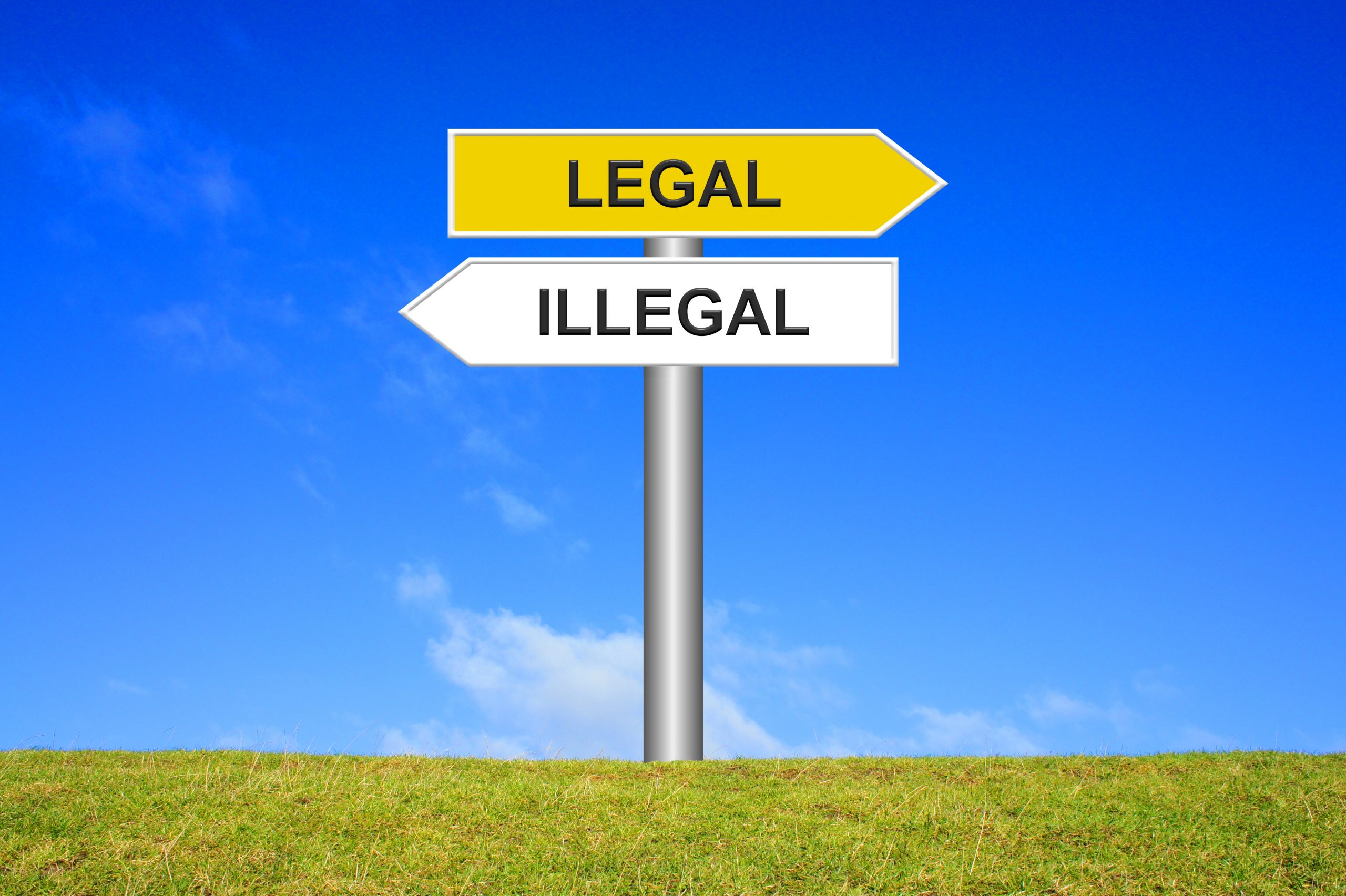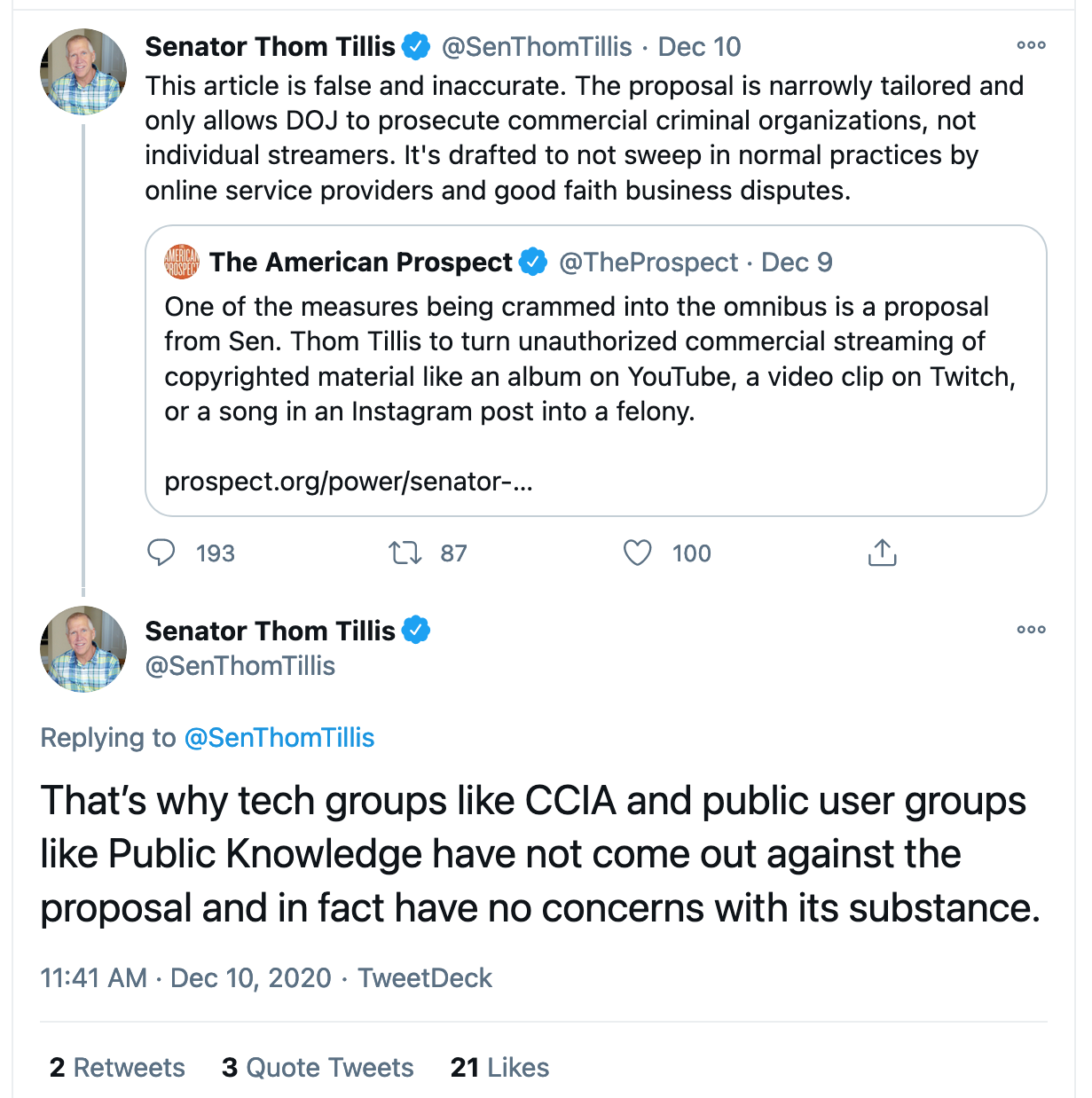“This commonsense legislation was drafted with the input of creators, user groups, and technology companies and is narrowly targeted so that only criminal organizations are punished and that no individual streamer has to worry about the fear of prosecution.’” – Senator Tillis
 On Thursday, December 10, U.S. Senator Thom Tillis (R-NC), Chairman of the Senate Judiciary Subcommittee on Intellectual Property, released text of bipartisan legislation titled the “Protecting Lawful Streaming Act of 2020” (the Act). The Act would punish commercial, for profit streaming piracy services that willfully and for commercial advantage or private financial gain offer to the public illicit services dedicated to illegally streaming copyrighted material. The bill is co-sponsored by Senators Patrick Leahy (D-VT), Marsha Blackburn (R-TN), Mazie Hirono (D-HI), Catherine Cortez Masto (D-NV), John Cornyn (R-TX), Richard Blumenthal (D-CT), Chris Coons (D-DE), Kelly Loeffler (R-GA), and David Perdue (R-GA).
On Thursday, December 10, U.S. Senator Thom Tillis (R-NC), Chairman of the Senate Judiciary Subcommittee on Intellectual Property, released text of bipartisan legislation titled the “Protecting Lawful Streaming Act of 2020” (the Act). The Act would punish commercial, for profit streaming piracy services that willfully and for commercial advantage or private financial gain offer to the public illicit services dedicated to illegally streaming copyrighted material. The bill is co-sponsored by Senators Patrick Leahy (D-VT), Marsha Blackburn (R-TN), Mazie Hirono (D-HI), Catherine Cortez Masto (D-NV), John Cornyn (R-TX), Richard Blumenthal (D-CT), Chris Coons (D-DE), Kelly Loeffler (R-GA), and David Perdue (R-GA).
Current Law
Criminal infringement via streaming or “publicly performing” can presently only be charged as a misdemeanor. Although violations of the reproduction and distribution rights of copyright owners can be charged as felonies, steaming is the most common form of copyright infringement, thus the inability to charge streaming as a felony creates a “streaming loophole” that is harmful to the U.S. economy. Streaming piracy costs the U.S. economy billions of dollars every year and impacts major motion pictures, television programs, music, audiobooks, live sports, and pay-per-view programming. According to Senator Tillis, “[t]he shift toward streaming content online has resulted in criminal streaming services illegally distributing copyrighted material that costs the U.S. economy nearly $30 billion every year, and discourages the production of creative content that Americans enjoy.”
The Protecting Lawful Streaming Act
 The Act would not affect normal practices by online service providers, good faith business disputes, noncommercial activities, or in any way impact individuals who access pirated streams or unwittingly stream unauthorized copies of copyrighted works. Senator Tillis noted that “[t]his commonsense legislation was drafted with the input of creators, user groups, and technology companies and is narrowly targeted so that only criminal organizations are punished and that no individual streamer has to worry about the fear of prosecution.” He added in a tweet responding to an article by The American Prospect on December 9 that the proposal is “drafted to not sweep in normal practices by online service providers and good faith business disputes.”
The Act would not affect normal practices by online service providers, good faith business disputes, noncommercial activities, or in any way impact individuals who access pirated streams or unwittingly stream unauthorized copies of copyrighted works. Senator Tillis noted that “[t]his commonsense legislation was drafted with the input of creators, user groups, and technology companies and is narrowly targeted so that only criminal organizations are punished and that no individual streamer has to worry about the fear of prosecution.” He added in a tweet responding to an article by The American Prospect on December 9 that the proposal is “drafted to not sweep in normal practices by online service providers and good faith business disputes.”
In particular, the Act will provide the Department of Justice with the authority to bring felony charges against a digital transmission service that:
- Is primarily designed or provided for the purpose of streaming copyrighted works without the authority of the copyright owner or the law; or
- has no commercially significant purpose or use other than to stream copyrighted works without the authority of the copyright owner or the law; or
- is intentionally marketed by or at the direction of that person to promote its use in streaming copyrighted works without the authority of the copyright owner or the law.
Stakeholder Comments
While Public Knowledge announced that that they “do not see the need for further criminal penalties for copyright infringement,” the group noted that the bill is narrowly tailored and avoids criminalizing users and streamers who may include unlicensed works as part of their streaming content. The group also expressed appreciation for Senator Tillis’ decision to release the text of the Act, and “his leadership in bringing in consumer groups to the table, listening to our concerns, and working to prevent risk to end users and legitimate streamers and streaming platforms.”
The Computer & Communications Industry Association (CCIA), whose members include companies like Amazon, Google, Facebook, and Twitter, said that—while it took issue with the inclusion of The Case Act and the Trademark Modernization Act in the year-end federal spending bill introduced last week—it was “not opposing the [negotiated, compromise language of the] Protect Lawful Streaming Act.” CCIA President Matt Schruers said: “While CCIA does not oppose compromise language regarding streaming, the inclusion of the CASE Act, a controversial new venue for federal litigation in spending legislation is inappropriate. Exposing small businesses and Internet users to high penalties without effective due process in a new venue would enable litigants to circumvent the existing safeguards provided by the federal judicial system.”
Kevin Erickson, director of the Future of Music Coalition, strongly supported the proposed streaming legislation, which he said strikes the right balance between protecting expression online and “appropriately targets bad-faith businesses, not end users or individual streamers.” “We want to see a flourishing of legal, licensed services with diverse business models that allow for creators to connect with audiences on their own terms, and to be fairly compensated for their creative labor,” Erickson said.
He added: “Infringing commercial streaming services don’t just hurt creators and copyright holders—they distort the marketplace for creative works and make it more difficult for more diverse licensed streaming services to get off the ground with sustainable pricing models. Consumers are harmed, because they are left with fewer choices.”

![[IPWatchdog Logo]](https://ipwatchdog.com/wp-content/themes/IPWatchdog%20-%202023/assets/images/temp/logo-small@2x.png)

![[[Advertisement]]](https://ipwatchdog.com/wp-content/uploads/2023/01/2021-Patent-Practice-on-Demand-1.png)
![[Advertisement]](https://ipwatchdog.com/wp-content/uploads/2024/04/Artificial-Intelligence-2024-REPLAY-sidebar-700x500-corrected.jpg)
![[Advertisement]](https://ipwatchdog.com/wp-content/uploads/2024/04/Patent-Litigation-Masters-2024-sidebar-700x500-1.jpg)

![[Advertisement]](https://ipwatchdog.com/wp-content/uploads/2021/12/WEBINAR-336-x-280-px.png)
![[Advertisement]](https://ipwatchdog.com/wp-content/uploads/2021/12/2021-Patent-Practice-on-Demand-recorded-Feb-2021-336-x-280.jpg)
![[Advertisement]](https://ipwatchdog.com/wp-content/uploads/2021/12/Ad-4-The-Invent-Patent-System™.png)






Join the Discussion
3 comments so far.
Brayden Mech
December 19, 2020 09:29 pmI tend to not enjoy it when a “WatchDog” makes claims that a bill simply won’t be over reaching without giving direct reference to its source material. I’ve seen more compelling twitter threads that actually pull up pages of the bill to discuss than this garbage.
This Tillis as well is apparently tone deaf. The current online social media scene has already had enough of dealing with a nearly monthly assault of random laws and copy right protection pursuits that end up damaging, ruining, or making it a pain to act online at all. Not only is the Bill in question suspicious as a whole, but so to is the timing for the general public, we only see this as a threat. Perhaps this adds to growing sentiments that the DMCA has taken things too far.
JH5
December 16, 2020 04:57 pmCopyright law already goes way too far. It needs reform, but this is taking it in the wrong direction. Thillis is soulless, and his bill Orwellian.
Pro Say
December 15, 2020 03:13 pm“Exposing small businesses and Internet users to high penalties without effective due process in a new venue would enable litigants to circumvent the existing safeguards provided by the federal judicial system.”
Yet more hypocrisy from the CCIA; when their statement is rewritten for patents:
“Exposing small innovative companies and independent inventors to the loss of their innovations without effective due process in a new venue (IPRs & PGRs) would enable we infringers to circumvent the existing safeguards provided by the federal judicial system.”